Today we had a bit of a
lie-in. I made tea at 06:30 and we enjoyed it with our books. After breakfast
we went in search of an ATM and a shop for some fresh food. I don’t know why
but our impression of Sassnitz from a previous visit was not a good one but as
we walked into the small town we were enchanted by the almost Mediterranean
feel of the place and we really liked some of the houses that had been built at
the beginning of the last century, or thereabouts. Sassnitz has always been a holiday town, and I guess
some people liked it here so much that they built holiday homes here or houses
that they could rent to holidaymakers. One of the buildings that impressed us
was the police station, at least we think that’s what it was from our looking
at the tourist map that we had (see photo).
Not only is Sassnitz a
pleasant town, it is also right next to an UNESCO World Heritage site, again a
primeval forest but this time the principal tree was the beech, in a National
Park called the Jasmund National Park of some 3000 hectares.
The beech forests
that used to more or less cover Europe disappeared during the ice ages, beech
can not tolerate very cold conditions and that is why there were few in Poland,
where presumably the winters are too harsh. Anyway, beeches are slowly
spreading northwards and this wooded area around Sassnitz represents a success
story for this magnificent tree. Another reason for UNESCO’s interest are the
chalk cliffs and the shallow seas around them, which are spawning grounds for
large numbers of fish and indeed some 20% of the park is this very area.
However the primary reason is the old beech woods and the huge variety of
ecosystems here, with some 100 bogs, lakes and streams within its boundaries.
Of course we had to see this so off we set after lunch for an exploratory walk,
firstly along the sea front and later climbing a little to get into the trees
just where the chalk cliffs started.
It was delightfully
mosquito free under the cathedral – like canopy of the beech wood.
Even though
there were people around, there was very little sound, it is as if people felt
they were in church and could only talk in whispers, it was lovely. It wasn’t a
long walk, or at least ours wasn’t, all we wanted was an outlook over the
cliffs and after 20 minutes or so we got one. They really are crumbling away
these cliffs, it would be dangerous to get too close to the edge – there was
plenty of evidence of rock falls around. On the way back and on a different path,
we found a series of wooden steps down the cliffs onto the beach. The beach is
100% flint pebbles and rocks, all originally from within the retreating cliffs.
One exception to this was a huge boulder just a few yards out in the water. It
had two iron bolts in it and there was an explanatory sign nearby. Apparently
this coast used to have several boulders such as this one but most of them were
blown up and transported to help make the long Sassnitz breakwater. These
boulders are called ‘erratics’, they are the result of glaciation. Glaciers
erode bits of rock as they move and they carry these within them.
When the
glaciers melt, the rocks are freed from their icy tomb. They may have travelled
hundreds of miles in this fashion and our boulder was a surviving example of
them, fondly known by the locals as ‘Klein Helgoland’ or its other name, the ‘Uskan’.
The reason for the bolts is that there used to be a bench on it and a bridge to
get sitters across but winter storms have destroyed it. Incidentally, Rügen
folk call stones such as Uskan ‘Swan Stones’ as according to local legend,
newborns are not delivered by storks, rather they are deposited on boulders
such as Uskan by swans. Nice story.
Shortly after Uskan we
went inland a little and soon ended up
back in Sassnitz, passing a nice shell shape roofed bandstand on the way. A
nice walk in a pleasant town. That
evening, we went to one of the restaurants on the quayside and I had flounder
and bratkartoffeln and Julie’s fish was her favourite mildly pickled young
herring, matjes, also with bratkartoffeln ( fried potatoes, tiny bits of bacon
and fried onion mix). It had been a nice day and we were glad to have made it
here. Tomorrow will be an early start as we need to get over to Bornholm, 50
miles away and the wind is forecast to become quite strong later in the day,
when we would hope to have made shelter in the marina at the capital, Rønne.

 Sassnitz, Mecklenburg-Vorpommern, Germany
Sassnitz, Mecklenburg-Vorpommern, Germany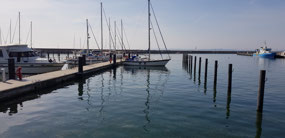
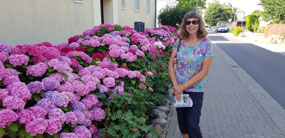
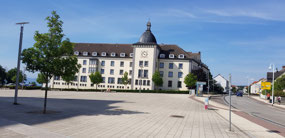
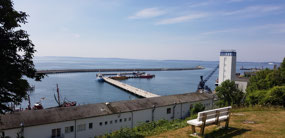




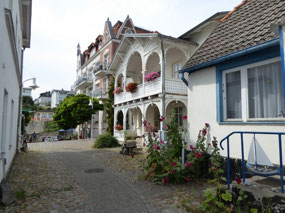
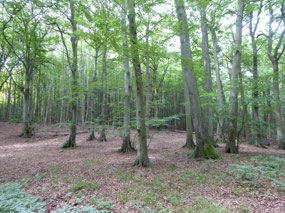
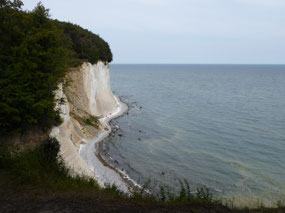
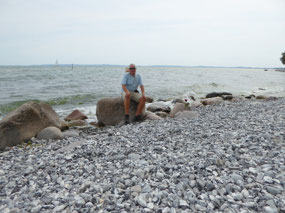
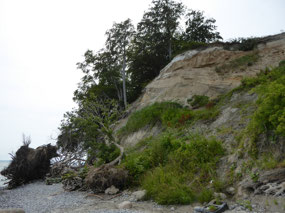
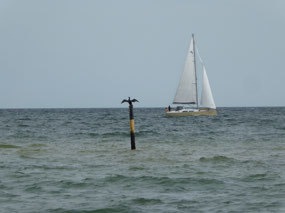
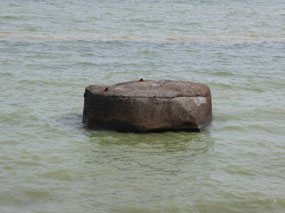
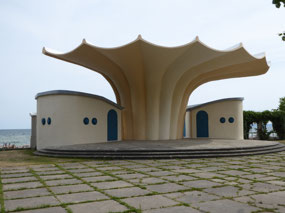
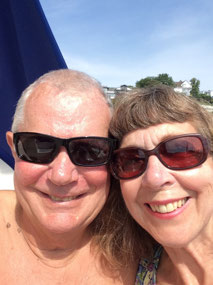
2025-05-23